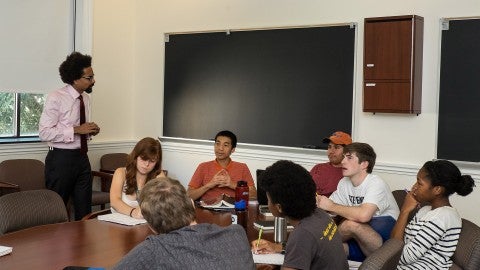Before you apply to our graduate program, here are some helpful hints:
1. We only admit students whose interests clearly fit our existing faculty and fields of study available on our website. You do not have to have a specific research topic in mind, but you do need to commit to one of our featured fields of graduate study. We have to reject students who are well qualified but do not fit these fields, because we cannot provide adequate mentorship to them.
2. Have you singled out one or more faculty members with whom you would like to work, and named them in your Statement of Purpose? Is the primary advisor you have in mind a tenured (associate or full) professor?
3. Please contact the faculty who interest you, preferably by email, ahead of applying. Such contacts are valuable to us and allow us to inform you of faculty plans such as impending departures or research leaves.
4. Please be aware that we look closely at your undergraduate coursework in history. If you were not a history major, we will want to know how you have compensated for your relative unfamiliarity with the field, or how you plan to do so.
5. If your chosen field requires a language other than your first language, we will want to know what level of skill you have in that language, and how you plan to improve your foreign language skills if necessary. We will generally not accept a student who plans, for example, to work in the area of Latin American history but has learned neither Spanish nor Portuguese. The workload in history graduate school is too intense to permit more than the improvement of existing foreign language skills. There is not usually time to learn a new language from scratch. Acquiring or strengthening relevant foreign language skills is one of the most important ways you can strengthen your application.
6. When choosing your recommenders, consider that we are primarily interested in how you performed in history classes. Letters of recommendation from faculty in fields that are not closely related to history are not as useful to us, and letters from employment supervisors are even less useful to us.
7. Take full advantage of the Statement of Purpose to lay out your intellectual interests (especially courses and books that led you to consider graduate study in history). Non-academic aspects of your life may be relevant, but your academic interests will always be primary for us. We will judge your capacity for hard work and your ability as a writer by 1) the care with which your statement and writing sample are written, 2) your recommenders’ comments, and 3) the grades you earned.
8. We admit students with or without master’s degrees, and both do well in our program. If your undergraduate coursework in history was limited, or your grades were not good, then a master’s degree in history with very good grades and recommendations can compensate.
9. All students are admitted on the same basis, for the same stipend package of five years’ support. We can only admit a small number of students each year. Consider that you are competing against several dozen other applicants for one of those six spots. The care with which you prepare your application, and the depth and clarity of the information you provide us about your preparation and areas of interest, will set you apart from the others.

